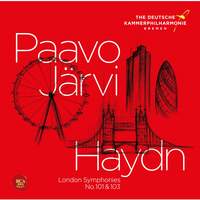Recording of the Week,
A new Haydn symphony series from Paavo Järvi
An exciting project gets underway this week, with the first instalment of Paavo Järvi’s planned complete Haydn London Symphonies, starting with No. 101 (the ‘Clock’) and No. 103 (the ‘Drum Roll’). Yes – the same Paavo Järvi who to many people is known as a committed champion of late Romantic and twentieth-century repertoire, especially by composers from North-Eastern Europe. The Haydn comes, though, from the same stable as his Beethoven, Brahms and Schumann symphony cycles – namely, his long and fruitful relationship with the Deutsche Kammerphilharmonie Bremen, with whom he’s focused on Classical and earlier Romantic works.

Deadpan delivery that lands every time
There's an indefinable air of comic timing about these, which if it’s handled badly can fall very flat. Järvi shows an innate grasp of this live on stage – I’ve never heard anyone actually get a laugh from a concert audience in the middle of a Haydn symphony before – and even in a recording the unsentimental dryness of his humour comes across. I don’t think it’s stretching things to see a kindred spirit here to a man who wrote music for shaking up audiences of lethargic worthies.
What makes the Deutsche Kammerphilharmonie Bremen particularly special is their unusually democratic ethos. While there is of course a conductor, the “chamber” nature of the ensemble is central to how they operate, and occasionally the effect of this is directly apparent in the music. In the Trio of the third movement there’s a delightful moment where Haydn imitates the hesitant playing of an inept amateur band. It’s often said that one of the hardest things for a good actor to do is to portray a bad one, but flautist Bettina Wild and bassoonist Rie Koyama pull it off, injecting just the right amount of timid uncertainty into their playing, and I’m sure we have the nature of the orchestra – giving its members that extra bit of individuality – to thank in part.
Another thing that stands out about these performances is Järvi’s extraordinary ability to create a sense of nervous intensity, of keeping his powder dry. Haydn loves to start his fast movements off agile but quiet, only later letting things off the leash (as in the fourth movement of the Clock), and indeed the Kammerphilhamonie’s delicacy and transparency are the rule rather than the exception – the tutti outbursts come almost as a relief, releasing the pent-up tension of keeping a lid on things.
Why, why, why, divojčica
The sense of fun is equally present in the Drum Roll – as is the deep connection to Croatian folk-music (listen to the first two lines of the song below, perhaps dialled up to 2x speed, and then to the opening of the final movement!) Entire melodies are seemingly lifted from communities Haydn knew, and used as motifs – with the horns in particular enjoying the implicit invitation to a slightly more rustic sound. I also couldn’t help hearing, in a vigorous semiquaver phrase in the first movement, echoes of modern revellers attempting Tom Jones’s Delilah. While I can’t prove that Järvi was leaning into it on purpose, I like to imagine that someone pointed out the similarity in a rehearsal and he wove it into the performance as an in-joke. It’s the sort of thing I could easily believe of a conductor and orchestra with this kind of rapport, and I can picture Papa Haydn cracking a smile.
All the ingredients of a truly memorable series
This might be one of the most significant new musical undertakings to take flight this year – all that Mahler, Shostakovich, Sibelius and Tüür notwithstanding, Järvi audibly just gets Haydn. It’s exciting, it threads the needle perfectly between gravitas and levity, and personally I’m totally on board for the rest of the series.
Deutsche Kammerphilharmonie, Paavo Järvi
Available Formats: CD, MP3, FLAC, Hi-Res FLAC



